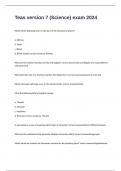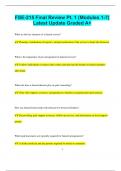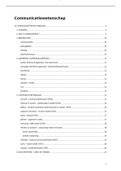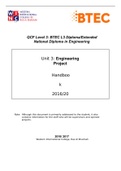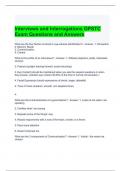International Strategy
Knowledge clips notes
Week 1 – clips 1
Strategies;
- Product diversification is a way for a company to appeal their products to a different set of
customers/ market
- Product consolidation
- Internationalization (think about what, where, how)
Risks of internationalization;
- Exchange rates
- Supply chain (assembly – production)
- Managing across cultures (motivate workers of different cultures)
- Host + home country risk (political changes, laws/ regulations, backlash of foreign
investment)
Going international is a difficult strategy since there a many aspects to consider
Strategy can be viewed as a decision making process, moving from a mission to rewards. Generic
strategies are (cost leadership, differentiation cost focus, differentiation focus). However you can
also view strategy via the Value Chain;
International business strategy = matching a multinational enterprise (MNE) internal strengths with
the opportunities found in cross-border environments while overcoming the disadvantages of being
a foreign company and/or capitalizing on the advantages of being a foreign company and so having
an international network.
Going abroad is not the default
O.L.I. paradigm = foreign direct investment only makes sense if a firm has 3 types of advantages;
1. ownership advantages (firm-specific advantages (FSA’s)
2. location advantages (attractiveness of the host country)
3. internalization advantages (advantages of doing-it-yourself)
Only when you possess these advantages it makes sense to expand internationally
The WHY, WHERE, WHAT and HOW of internationalization
- WHY, concern the internationalization motives. These can be;
o Market seeking (are there many consumers that want your product)
o Efficiency seeking (move production)
o Resource seeking (find particular raw materials inputs)
o Strategic asset seeking (knowledge, connectivity) – geographical advantage
- WHERE, location choice
o Attractiveness of country
o Distance to home country (not only the physical distance)
, - WHAT, what will be moved abroad
o Marketing & sales
o Manufacturing
o Purchasing / extraction
o R&D
- HOW, entry modes
o Export
o Licensing
o Franchising
o JV / Alliance
o FDI = acquisition / brownfield / greenfield
FDI is the most strong form of internationalization
Firm-Specific-Advantages (FSA’s) that are transferable abroad, so these are non-location bound FSA’s
- Patents
- Capital
- Technology (human skills to operate this can be more difficult to transfer)
- Brand name + image
Firm-Specific-Advantages FSA’s can also be not transferable abroad, so these are location bound and
make it harder for a company to internationalize;
- Location (of office / store )
- Supplier network – Supply chain network (create a complete new supply chain sometimes)
- Internationalize brands
- Skills (human skills)
Location advantages for both home and host country. When you have a very appealing home country
it might be less appealing to move abroad
- Silicon valley (as a region); can give access to the newest technology and developments
- China (huge market with high number of consumers), want to have a piece of the increasing
market
Recombination capabilities = the ability to adapt and recombine resources in such a way that they
maintain a firm’s competitiveness over time and across environments. Like ‘dynamic capabilities’, but
then with international dimension.
It is the ability to make combinations of resources and capabilities at home (if you do not
have specific good capabilities at home, you will not go international), with newly accessed
resources and capabilities abroad
The international arena and the recombination capabilities are built up over time and experience.
Host country specific experience reduces LOF in that specific country. General internationalization
experience increases the capability to recombine resources and capabilities across borders
Complementary resources that can be provided by external factors, are;
- Market knowledge / access to local market
- Government connections
- Complementary technology
Liability of foreignness (LOF); a foreign firm (MNE) has an a-priori disadvantage in comparison to a
local firm, due to; geographic / linguistic / economic / political / educational / institutional / cultural
distances. All these cultural distances create the first disadvantage before even moving abroad =
bounded rationality. Discrimination by public authorities, other companies or the public = bounded
reliability.
Knowledge clips notes
Week 1 – clips 1
Strategies;
- Product diversification is a way for a company to appeal their products to a different set of
customers/ market
- Product consolidation
- Internationalization (think about what, where, how)
Risks of internationalization;
- Exchange rates
- Supply chain (assembly – production)
- Managing across cultures (motivate workers of different cultures)
- Host + home country risk (political changes, laws/ regulations, backlash of foreign
investment)
Going international is a difficult strategy since there a many aspects to consider
Strategy can be viewed as a decision making process, moving from a mission to rewards. Generic
strategies are (cost leadership, differentiation cost focus, differentiation focus). However you can
also view strategy via the Value Chain;
International business strategy = matching a multinational enterprise (MNE) internal strengths with
the opportunities found in cross-border environments while overcoming the disadvantages of being
a foreign company and/or capitalizing on the advantages of being a foreign company and so having
an international network.
Going abroad is not the default
O.L.I. paradigm = foreign direct investment only makes sense if a firm has 3 types of advantages;
1. ownership advantages (firm-specific advantages (FSA’s)
2. location advantages (attractiveness of the host country)
3. internalization advantages (advantages of doing-it-yourself)
Only when you possess these advantages it makes sense to expand internationally
The WHY, WHERE, WHAT and HOW of internationalization
- WHY, concern the internationalization motives. These can be;
o Market seeking (are there many consumers that want your product)
o Efficiency seeking (move production)
o Resource seeking (find particular raw materials inputs)
o Strategic asset seeking (knowledge, connectivity) – geographical advantage
- WHERE, location choice
o Attractiveness of country
o Distance to home country (not only the physical distance)
, - WHAT, what will be moved abroad
o Marketing & sales
o Manufacturing
o Purchasing / extraction
o R&D
- HOW, entry modes
o Export
o Licensing
o Franchising
o JV / Alliance
o FDI = acquisition / brownfield / greenfield
FDI is the most strong form of internationalization
Firm-Specific-Advantages (FSA’s) that are transferable abroad, so these are non-location bound FSA’s
- Patents
- Capital
- Technology (human skills to operate this can be more difficult to transfer)
- Brand name + image
Firm-Specific-Advantages FSA’s can also be not transferable abroad, so these are location bound and
make it harder for a company to internationalize;
- Location (of office / store )
- Supplier network – Supply chain network (create a complete new supply chain sometimes)
- Internationalize brands
- Skills (human skills)
Location advantages for both home and host country. When you have a very appealing home country
it might be less appealing to move abroad
- Silicon valley (as a region); can give access to the newest technology and developments
- China (huge market with high number of consumers), want to have a piece of the increasing
market
Recombination capabilities = the ability to adapt and recombine resources in such a way that they
maintain a firm’s competitiveness over time and across environments. Like ‘dynamic capabilities’, but
then with international dimension.
It is the ability to make combinations of resources and capabilities at home (if you do not
have specific good capabilities at home, you will not go international), with newly accessed
resources and capabilities abroad
The international arena and the recombination capabilities are built up over time and experience.
Host country specific experience reduces LOF in that specific country. General internationalization
experience increases the capability to recombine resources and capabilities across borders
Complementary resources that can be provided by external factors, are;
- Market knowledge / access to local market
- Government connections
- Complementary technology
Liability of foreignness (LOF); a foreign firm (MNE) has an a-priori disadvantage in comparison to a
local firm, due to; geographic / linguistic / economic / political / educational / institutional / cultural
distances. All these cultural distances create the first disadvantage before even moving abroad =
bounded rationality. Discrimination by public authorities, other companies or the public = bounded
reliability.


